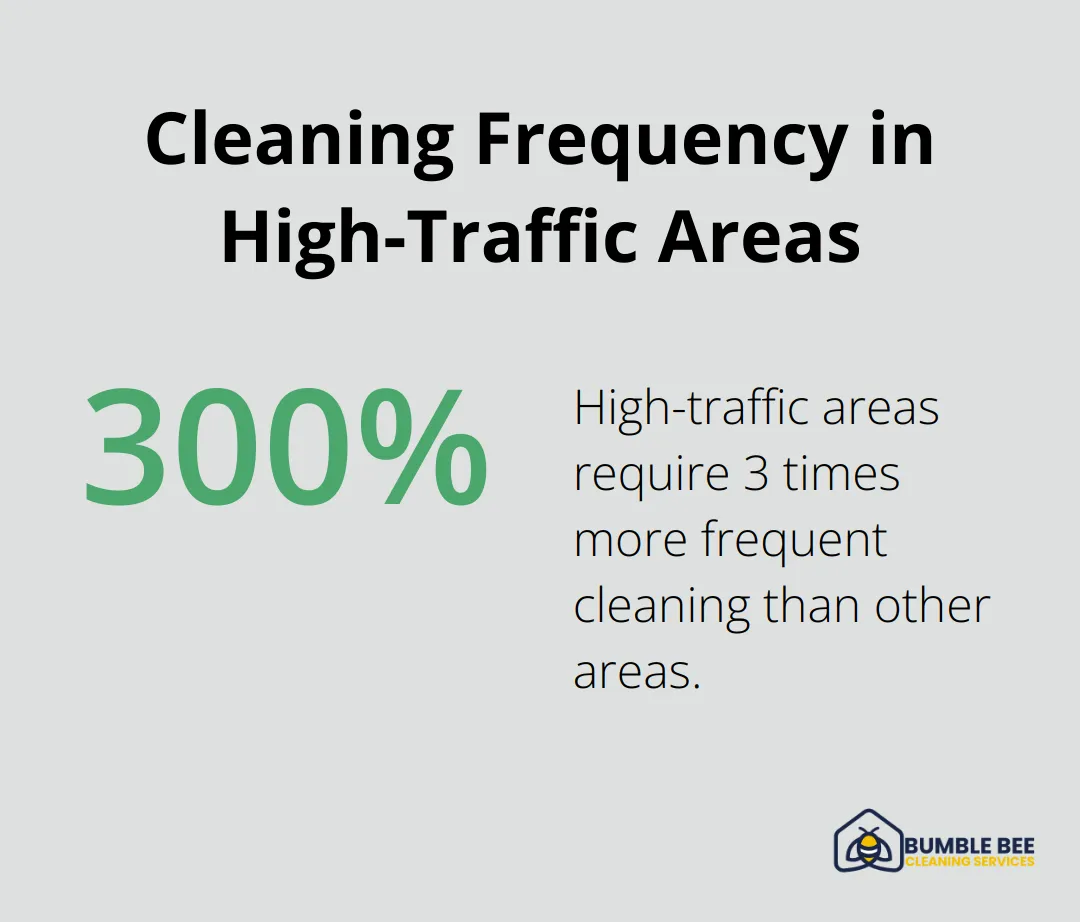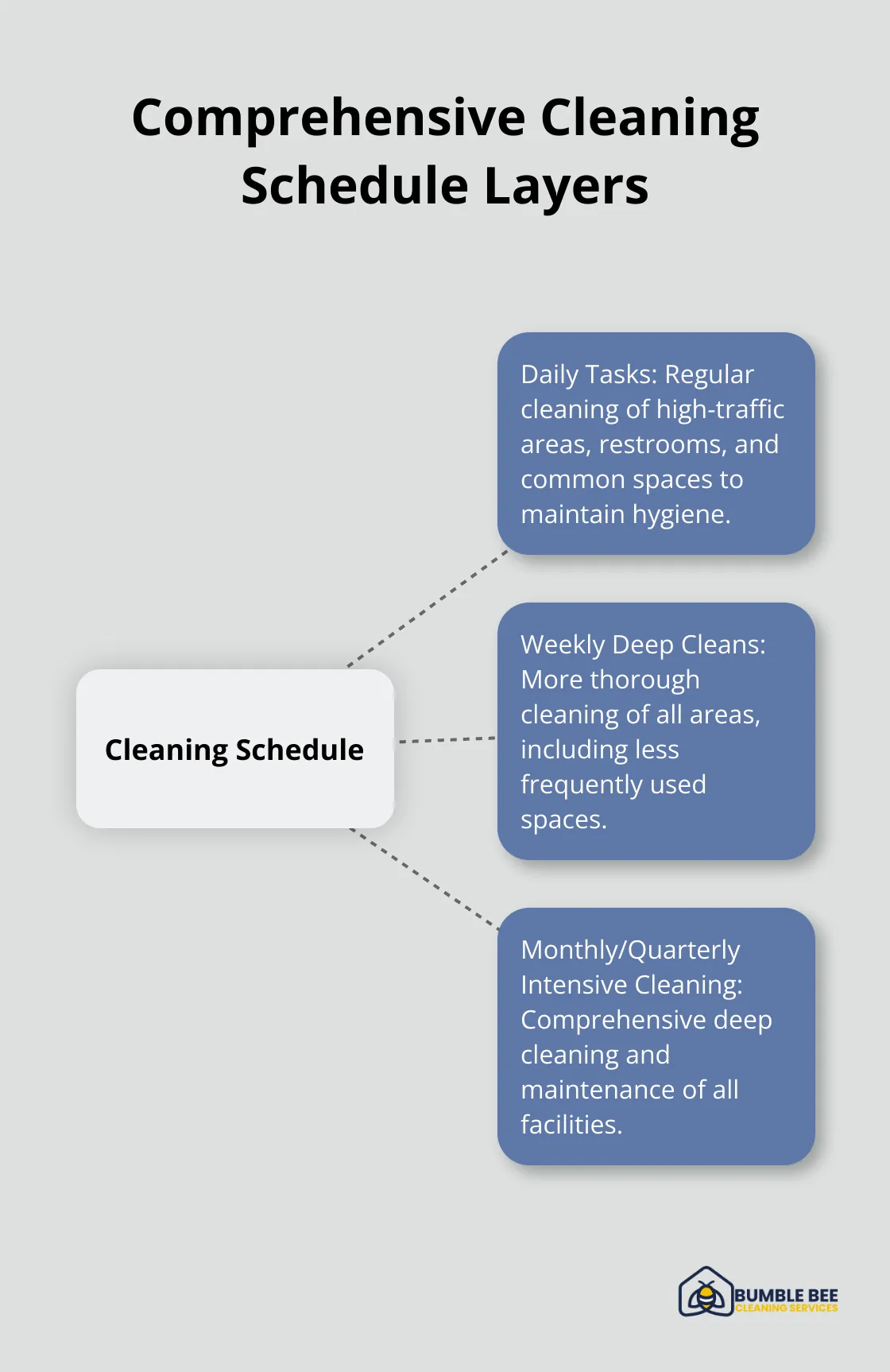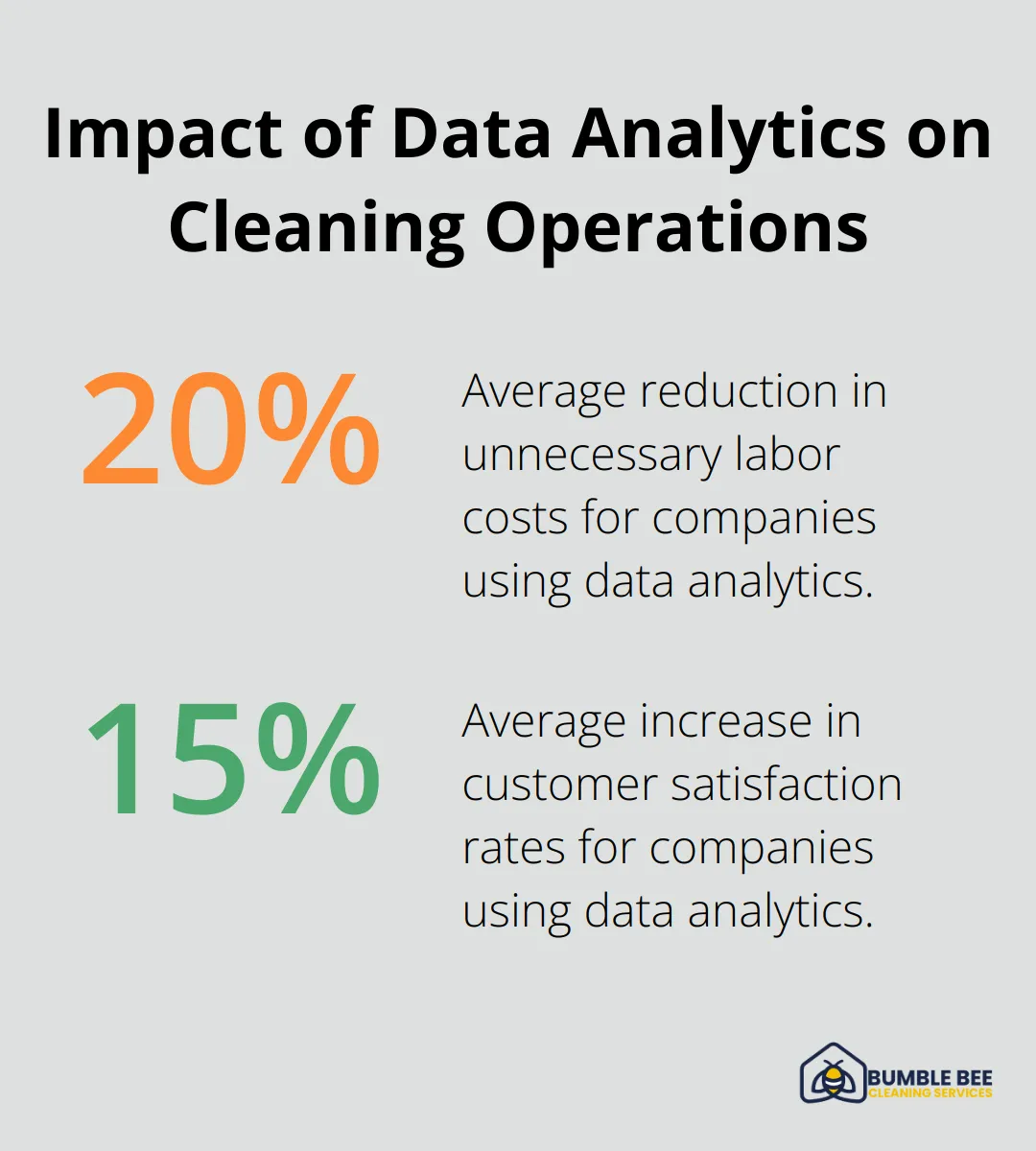Seattle businesses face unique cleaning challenges due to the city’s climate and diverse industries. At Bumble Bee Cleaning Services, we understand the importance of tailored janitorial scheduling to meet these specific needs.
Effective cleaning schedules can significantly impact a business’s efficiency, employee productivity, and customer satisfaction. In this post, we’ll explore strategies for optimizing janitorial schedules to keep Seattle businesses spotless and running smoothly.
What Are Seattle’s Unique Business Cleaning Challenges?
Seattle’s business landscape presents distinct cleaning challenges that demand tailored solutions. The city’s notorious rainy climate, coupled with its diverse industries, creates a unique set of requirements for maintaining clean and hygienic workspaces.
Combating Seattle’s Wet Weather
Despite the obstacles posed by the growing population and unpredictable weather conditions, the city remains committed to upholding high sanitation standards. Moisture tracked into buildings can quickly lead to slippery floors, creating safety hazards. Businesses require more frequent floor cleaning and drying to mitigate these risks. The damp climate also fosters mold growth, necessitating regular inspections and treatments of problem areas, especially in basements and poorly ventilated spaces.
Addressing High-Traffic Hotspots
Seattle’s bustling business districts, from downtown to South Lake Union, experience heavy foot traffic. Entranceways, lobbies, and elevators in these areas demand particular attention. These high-touch zones require cleaning up to three times more frequently than other areas to maintain a professional appearance and hygienic standards.

Meeting Industry-Specific Cleaning Requirements
Specialized cleaning approaches are necessary for different types of businesses. Certain industries have specific cleaning needs. Healthcare facilities and restaurants demand a higher level of hygiene and sanitation.
In tech offices, advanced cleaning techniques provide effective coverage on surfaces, eliminating harmful pathogens without damaging electronic equipment. Healthcare settings require the use of hospital-grade disinfectants and strict protocols to prevent cross-contamination.
The coffee shop culture in Seattle also presents unique challenges. The combination of high foot traffic, food preparation, and the need to maintain a welcoming atmosphere requires a delicate balance. Specific cleaning routines address these needs without disrupting the ambiance that Seattle’s cafes are known for.
Understanding these nuanced cleaning requirements helps businesses maintain a clean, safe, and productive environment. Addressing Seattle’s climate challenges, focusing on high-traffic areas, and tailoring approaches to specific industries ensures spaces remain impeccable, regardless of the unique demands they face. The next section will explore how to create efficient janitorial schedules that accommodate these distinctive Seattle business cleaning needs.
How to Create Efficient Janitorial Schedules
Align Cleaning with Business Operations
The foundation of an efficient janitorial schedule lies in its alignment with your business’s operational hours. Most Seattle businesses benefit from scheduling major cleaning tasks during off-hours or periods of low activity. Office buildings, for example, often prefer evening or early morning cleaning schedules when employees are absent.
However, some businesses require a different strategy. Restaurants and cafes may need more frequent cleaning during operational hours to maintain hygiene standards. In these cases, quick, targeted cleaning sessions during slower periods throughout the day prove effective.
Balance Frequency and Thoroughness
The optimal cleaning frequency depends on various factors, including foot traffic, type of business, and specific area requirements. High-traffic areas (such as lobbies, restrooms, and break rooms) typically need daily attention. Less-used spaces might only require weekly or bi-weekly cleaning.
A comprehensive cleaning schedule should include:
- Daily tasks
- Weekly deep cleans
- Monthly or quarterly intensive cleaning sessions
This layered approach ensures that all areas receive appropriate attention without overextending resources.

Adapt to Changing Needs with Flexibility
Flexibility in janitorial scheduling is essential, especially in Seattle’s dynamic business environment. Seasonal changes, special events, or unexpected situations may require adjustments to the regular cleaning routine. For instance, during Seattle’s rainy season, entrance areas might need more frequent attention to prevent slip hazards. Seattle receives an average of 38 inches of rain annually, which can significantly influence the cleaning industry.
Implementing a system that allows for easy schedule modifications is recommended. Digital scheduling tools can be particularly useful for this purpose, enabling quick adjustments and real-time communication with cleaning staff.
Utilize Data-Driven Insights
Modern cleaning services (like Bumble Bee Cleaning Services) use data analytics to optimize schedules. Data-driven cleaning is revolutionizing facility management, allowing for efficient allocation of resources, optimization of cleaning schedules, and improved decision-making. By tracking cleaning times, frequency of tasks, and customer feedback, businesses can make informed decisions about their janitorial schedules. This data-driven approach helps identify areas that may need more attention or where resources can be reallocated for better efficiency.
Incorporate Regular Training and Feedback
An often overlooked aspect of efficient janitorial scheduling is the continuous improvement of the cleaning staff. Regular training sessions ensure that cleaners are up-to-date with the latest techniques and products. Additionally, establishing a feedback system (both from clients and cleaning staff) can provide valuable insights for schedule optimization.
As we move forward, let’s explore how technology and tools can further enhance the optimization of janitorial schedules for Seattle businesses.
How Technology Enhances Janitorial Scheduling
Digital Scheduling Software: A Game-Changer
Digital scheduling software has transformed the landscape of janitorial services. These platforms allow real-time schedule adjustments, resource allocation, and task tracking. When a Seattle tech company unexpectedly extends its working hours, the cleaning schedule can be instantly modified to accommodate this change.
Businesses using digital scheduling software can achieve quantifiable savings from optimized scheduling that minimizes overtime, reduces overstaffing, and improves resource allocation.
Mobile Apps: Empowering Cleaners
Mobile applications have become indispensable tools for janitorial teams. These apps provide cleaners with instant access to their schedules, task lists, and communication channels with supervisors and clients. In Seattle’s dynamic business environment (where last-minute changes are common), this real-time communication proves invaluable.
A CleanLink survey revealed that 78% of cleaning professionals using mobile apps reported improved job satisfaction and productivity. This technology enables cleaners to work more autonomously and efficiently, leading to better results for Seattle businesses.
Data Analytics: Driving Continuous Improvement
Data analytics is perhaps the most powerful tool in the modern janitorial arsenal. The collection and analysis of data on cleaning times, task frequency, and customer feedback allow cleaning services to make data-driven decisions to optimize their operations.
Analysis might reveal that certain areas of a Seattle office building require more frequent cleaning during allergy season. This insight allows proactive schedule adjustments, improving overall cleanliness and occupant satisfaction.
The International Sanitary Supply Association (ISSA) reports that companies implementing data analytics in their cleaning operations see an average 20% reduction in unnecessary labor costs and a 15% increase in customer satisfaction rates.

IoT Integration: Smart Cleaning Solutions
The Internet of Things (IoT) has started to play a significant role in janitorial scheduling. Smart sensors can monitor foot traffic, detect when supplies need replenishment, and even measure air quality. This real-time data feeds into scheduling software, allowing for dynamic adjustments to cleaning routines.
For example, a sensor might detect high foot traffic in a particular area of an office, triggering an alert for immediate attention. This targeted approach ensures resources are used efficiently and high-traffic areas remain clean throughout the day.
AI-Powered Predictive Maintenance
Artificial Intelligence (AI) is taking janitorial scheduling to the next level. AI algorithms can analyze historical data and predict future cleaning needs. This predictive maintenance approach helps prevent issues before they occur, reducing downtime and improving overall cleanliness.
AI can also optimize routes for cleaning staff, ensuring the most efficient use of time and resources. In large office complexes or multi-building campuses (common in Seattle’s tech sector), this optimization can lead to significant time and cost savings.
Final Thoughts
Optimizing janitorial scheduling for Seattle businesses requires a strategic approach that considers unique local challenges and specific business needs. The integration of digital tools, mobile apps, and data analytics has transformed the way cleaning routines are planned and executed. These advancements enable real-time adjustments, improved communication, and data-driven decisions, which lead to more effective cleaning strategies.
Seattle’s diverse business landscape demands tailored cleaning solutions to address challenges posed by the rainy climate and meet industry-specific requirements. A customized approach to janitorial scheduling is essential for maintaining high standards of cleanliness and hygiene in various work environments. Professional cleaning services (like Bumble Bee Cleaning Services) utilize cutting-edge technology and industry best practices to create efficient, effective cleaning schedules tailored to each client’s unique needs.
We encourage businesses to reassess their current cleaning schedules and consider how a more strategic approach could benefit their operations. Bumble Bee Cleaning Services offers comprehensive solutions backed by years of experience and a commitment to excellence. Take the first step towards a cleaner, more efficient workplace by exploring the benefits of professional janitorial services.
